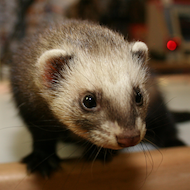New York considers end to ferret ban

Ferret keeping was banned in 1999.
New York health officials are considering a repeal of the city's ferret keeping ban, the New York Times reports.
In 1999, former New York mayor Rudolph Guiliani made it illegal to own ferrets, due to fears over rabies and attacks on young children. However, the move has prompted controversy among many.
According to the New York Times, current mayor Bill de Blasio is aiming to legalise ferret ownership once again.
In an internal paper reviewed by the paper, New York health officials weigh the pros and cons of allowing ferrets to be kept as pets.
On the pro side, officials said evidence shows ferrets do not bite more often or more severely than other pets of the same size. However, young children may be vulnerable to ferret bites, the internal paper says.



 The RCVS has announced a new version of its 1CPD mobile app, with enhanced features for veterinary surgeons and veterinary nurses to record their continuing professional development.
The RCVS has announced a new version of its 1CPD mobile app, with enhanced features for veterinary surgeons and veterinary nurses to record their continuing professional development.